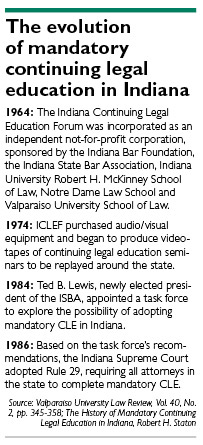Subscriber Benefit
As a subscriber you can listen to articles at work, in the car, or while you work out. Subscribe NowOn Jan. 17, the board of directors for the Indiana Continuing Legal Education Forum bid farewell to four board members. Three were Indiana State Bar Association delegates; one was the Indiana Bar Foundation delegate.
But leaders from all three organizations say it’s nothing personal – no bad blood, no hard feelings.
“This is not anything we sprung on them at the last minute or anything, this is the result of discussions that have been going on informally for at least two years,” said ICLEF president Mark McNeely.
ISBA president C. Erik Chickedantz explained that the change in ICLEF’s board leadership is not an acrimonious split.
 Chickedantz
Chickedantz“I don’t think there’s a dispute, a rift or anything like that,” Chickedantz said. “I think both boards have decided we’re not going to be as connected as we were in the past.”
Changing priorities
Last fall at its annual meeting, the ISBA board voted to change its policies to allow sections and committees of the state bar more freedom to produce their own CLE programs.
 McNeely
McNeelyUntil October 2011, the ISBA had an unwritten policy, Chickedantz explained, requiring sections that produce CLE programs that were three hours or longer to first offer the opportunity to produce the program to ICLEF. “If ICLEF wanted to, they took it over, and if they didn’t, the sections did it on their own,” he said.
With the policy change, sections and committees no longer have to give ICLEF the first shot at producing CLEs that are three hours or longer.
Chickedantz said the state bar also previously had an unwritten policy that in its publication Res Gestae, it would not accept advertisements from ICLEF competitors. That also changed in October.
Scott King, program director for ICLEF, said the state bar did inform ICLEF leadership of the impending change.
“That surprised us, and quite frankly, we were disappointed to see they wanted to move into CLE in that fashion,” King said.
New relationship
In January, the state bar announced it had hired a new CLE director, an indication of the state bar’s intention to produce more of its own CLE programs, McNeely said.
“They issued a letter to us in September saying we are competitors at this point, and it’s hard to have competitors be on your board of directors,” he said. Since that time, ICLEF had planned to eliminate those board positions.
“And in October, we gave them the opportunity to do this gracefully, and they declined,” McNeely explained.
Carissa Long, assistant director of communications for the ISBA, said that the state bar felt that until ICLEF changed its bylaws, the state bar delegates had a fiduciary duty to attend ICLEF board meetings.
Charles Dunlap, executive director of the Indiana Bar Foundation, said he understood the rationale behind ICLEF removing the foundation’s delegate to the board.
“We haven’t taken this as a slap in the face,” he said, adding that ICLEF is housed in the same building and is the bar foundation’s largest tenant. “From our standpoint, this didn’t really affect our relationship.”
King said he could not predict how the ISBA’s decision to produce more of its own CLE would affect ICLEF revenue. The two organizations, King said, have not shared in profits or revenue and are financially independent of each other.
“Obviously, we’ll still support ICLEF. They are the primary CLE provider in the state of Indiana, and I’m assuming they’ll continue to be,” Chickedantz said.•
Please enable JavaScript to view this content.
